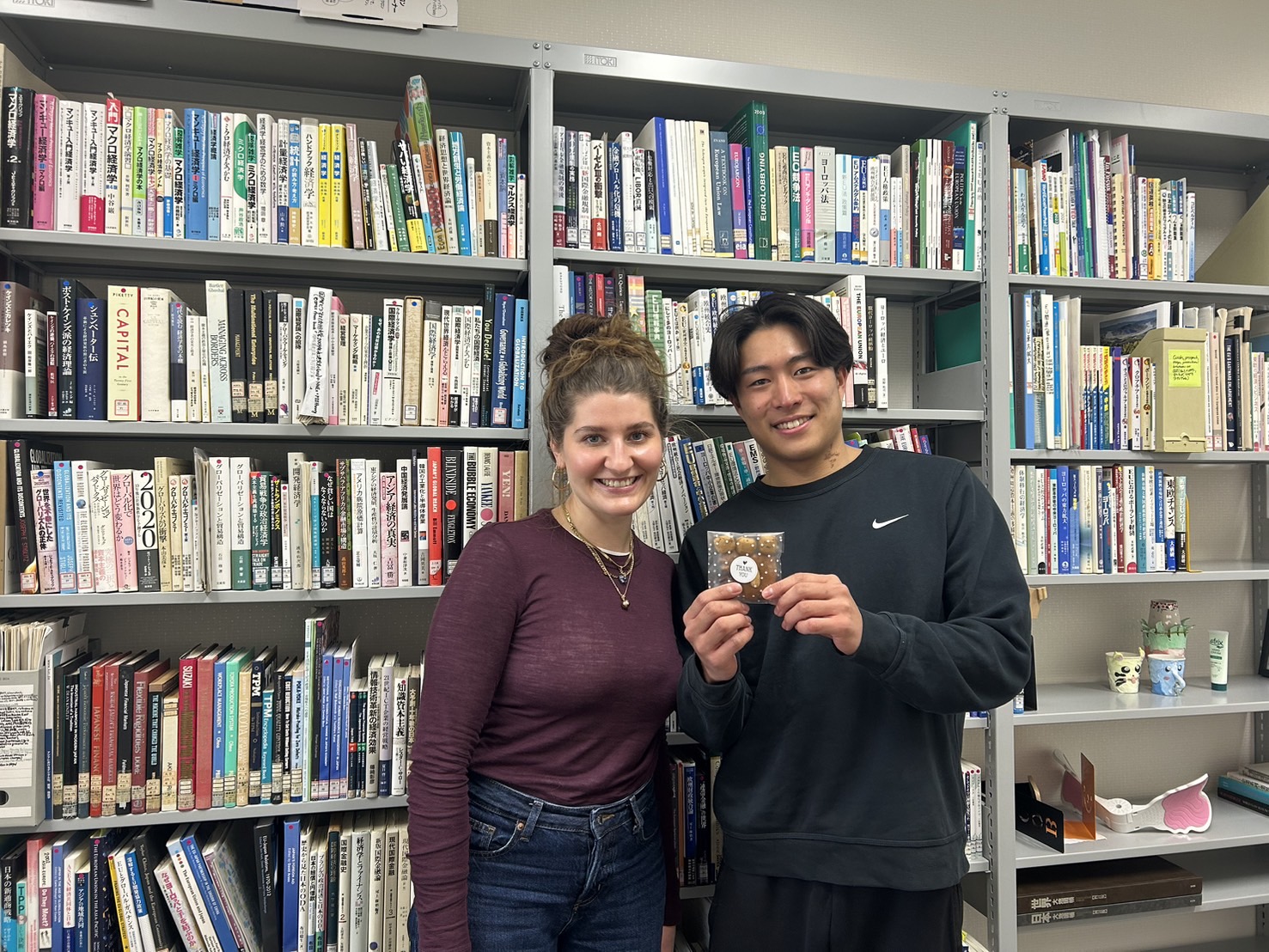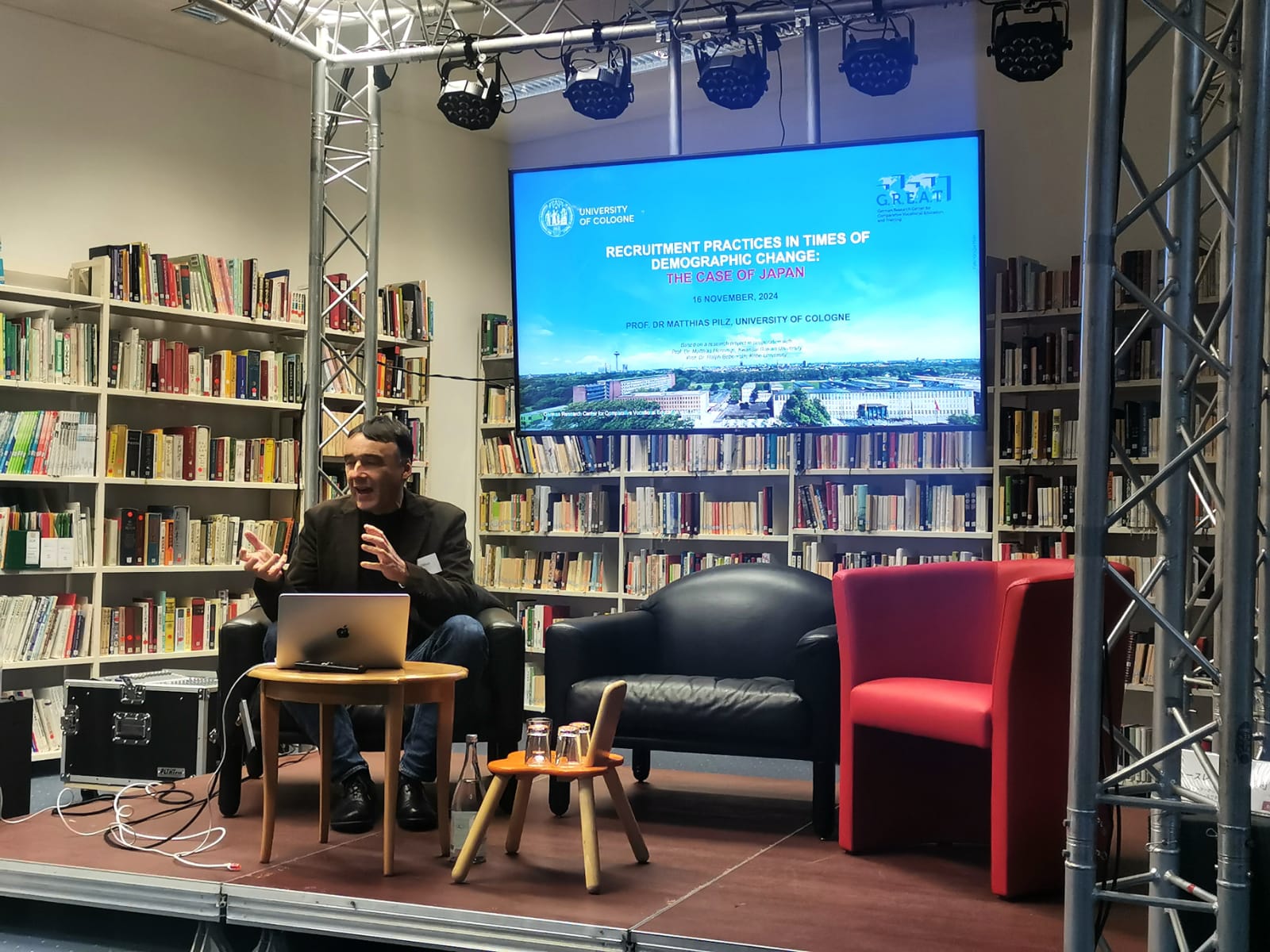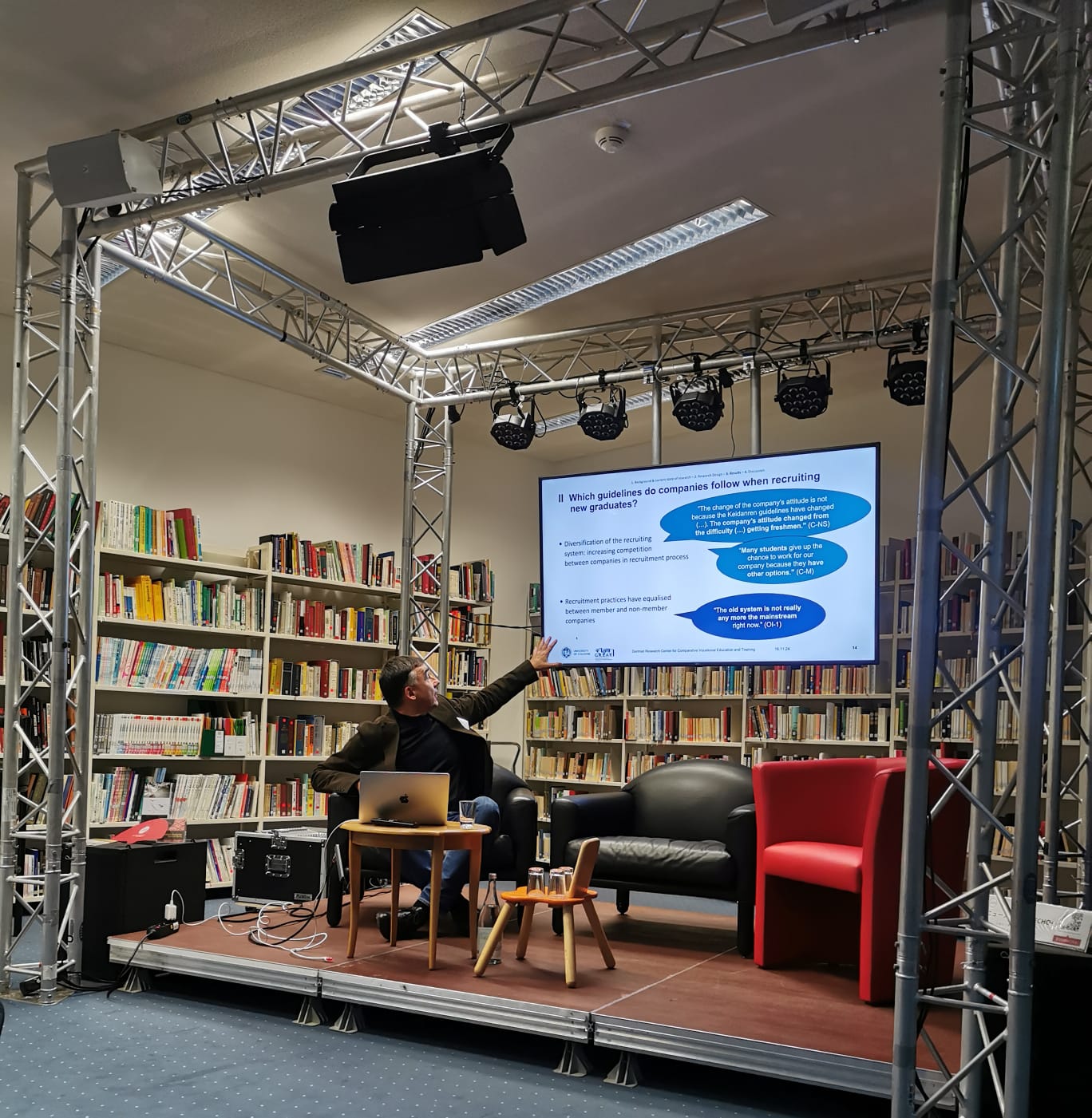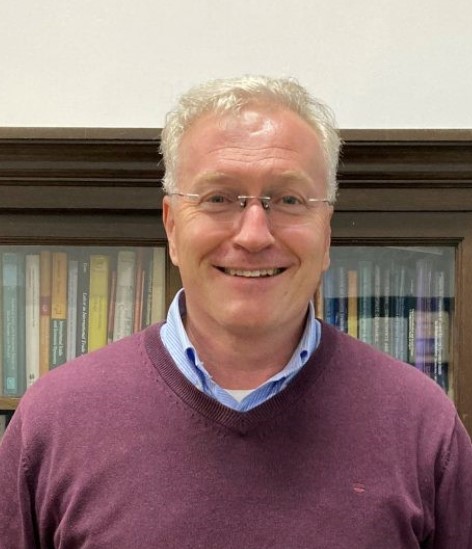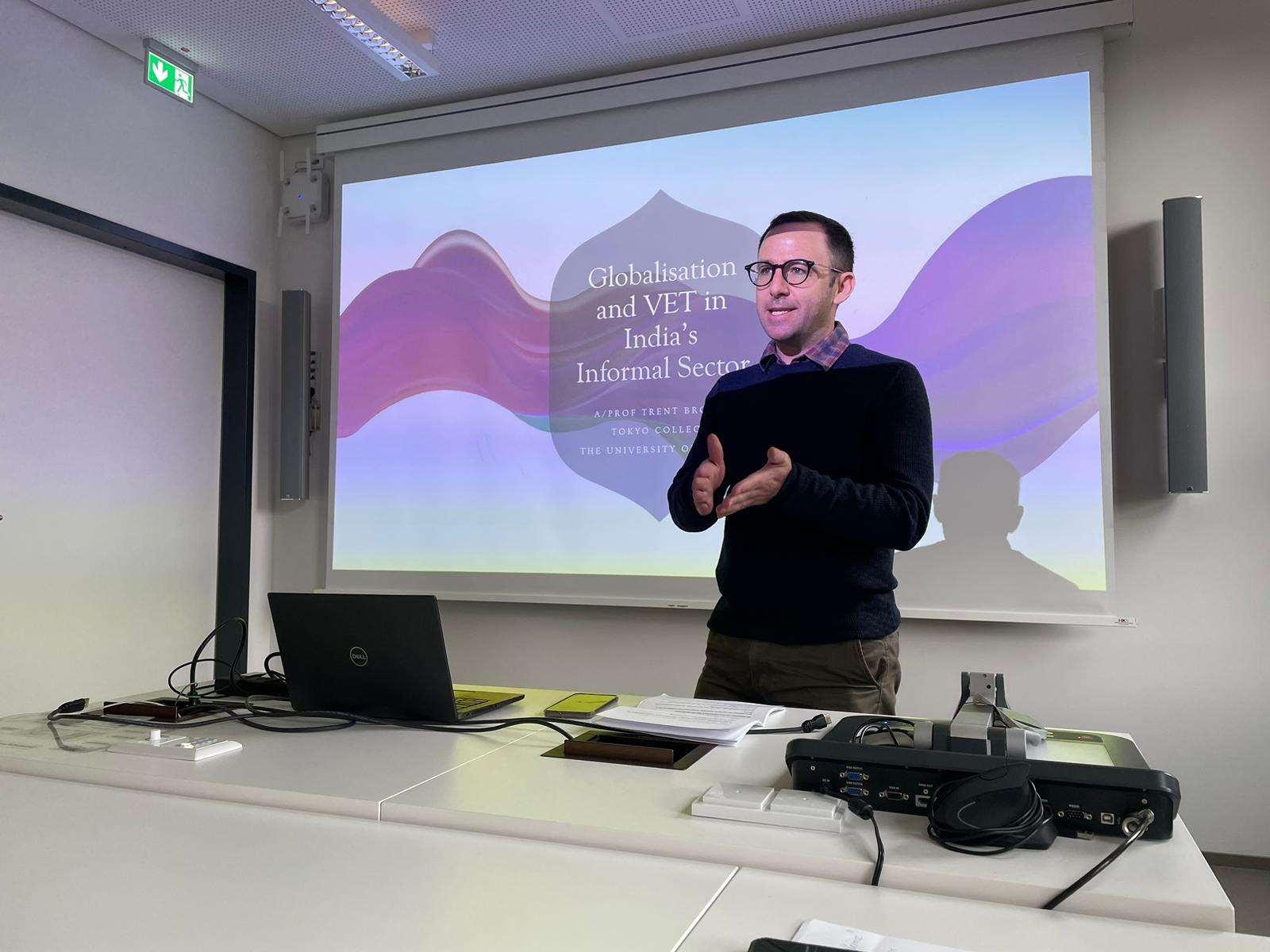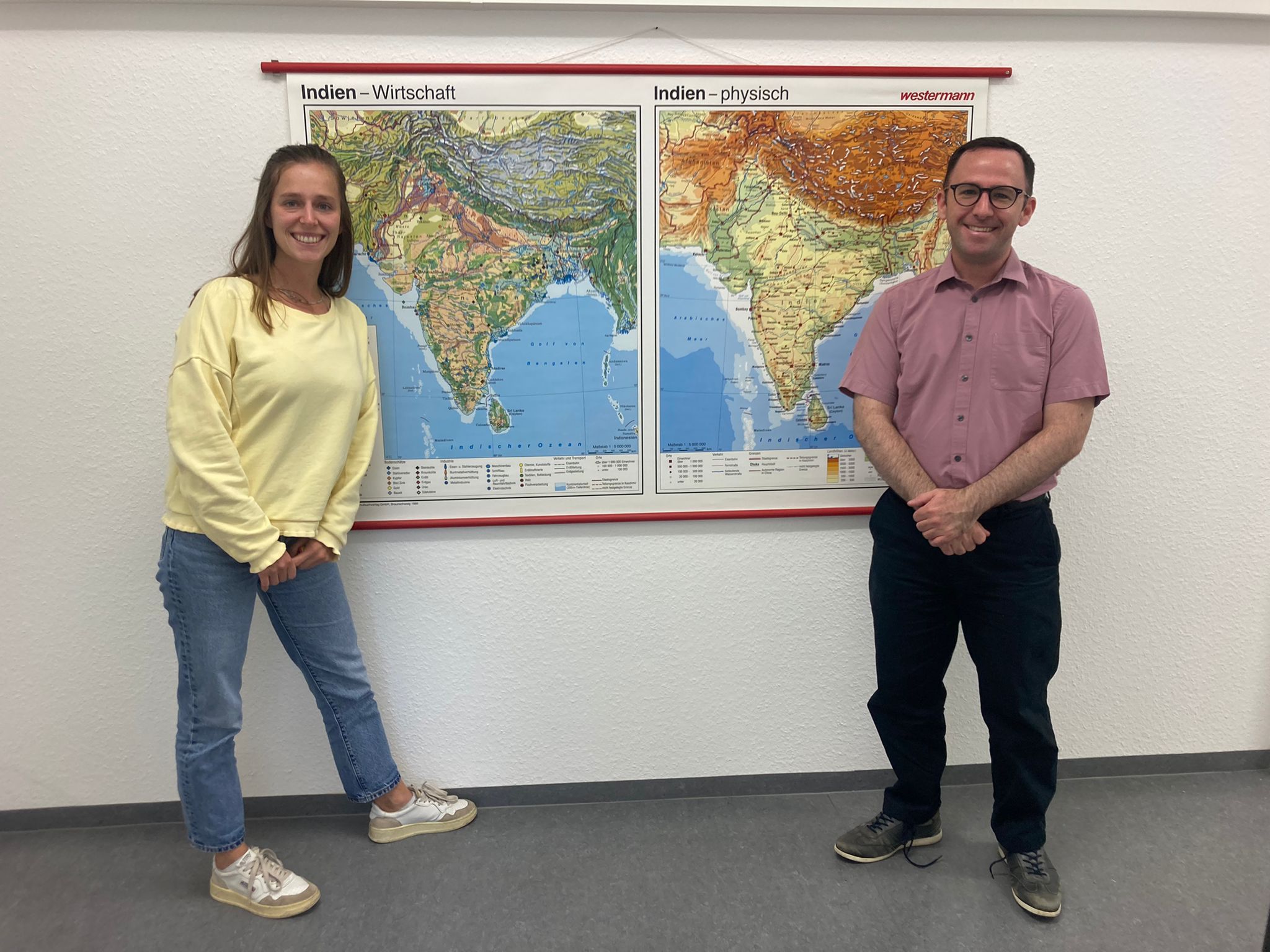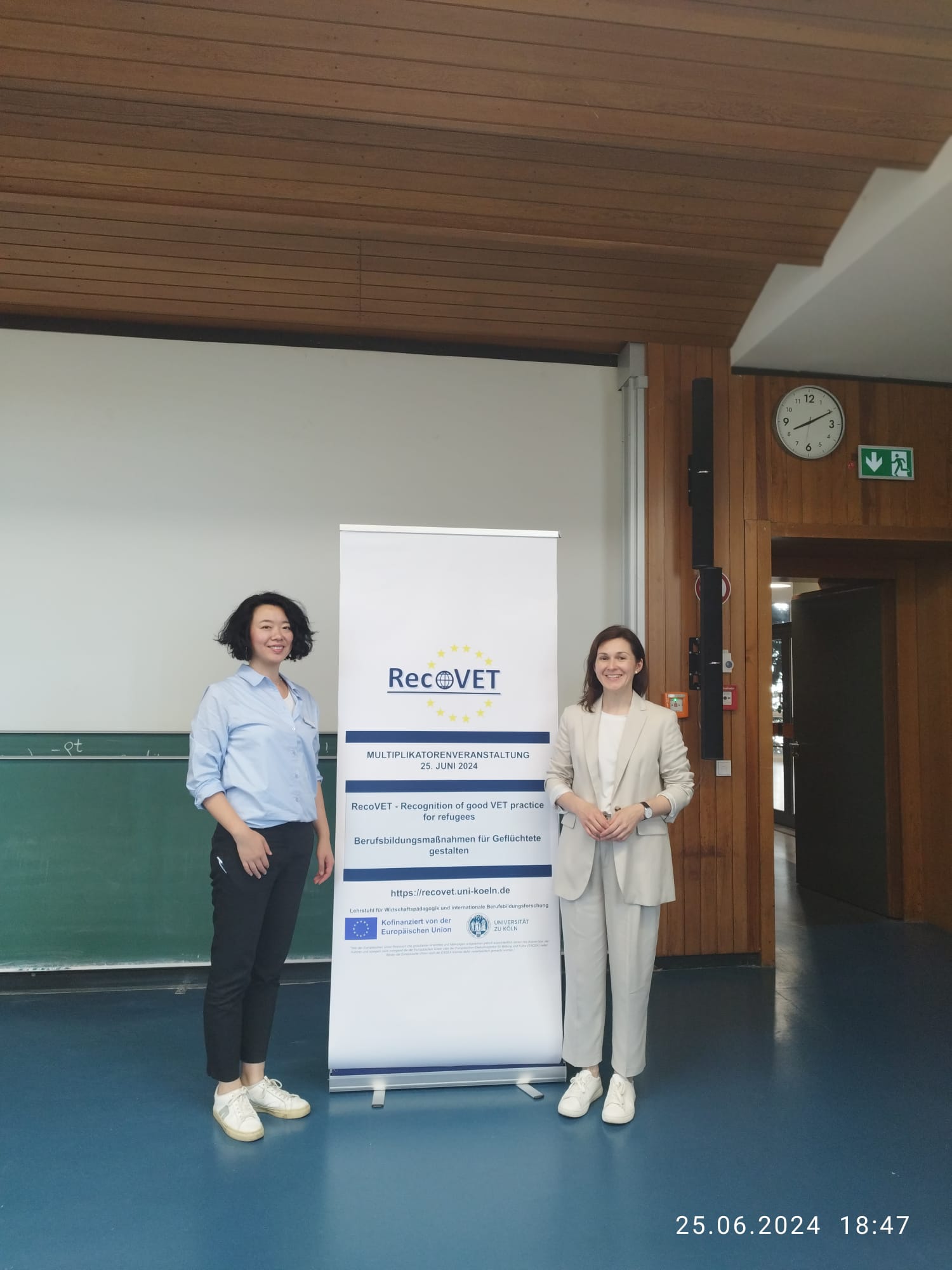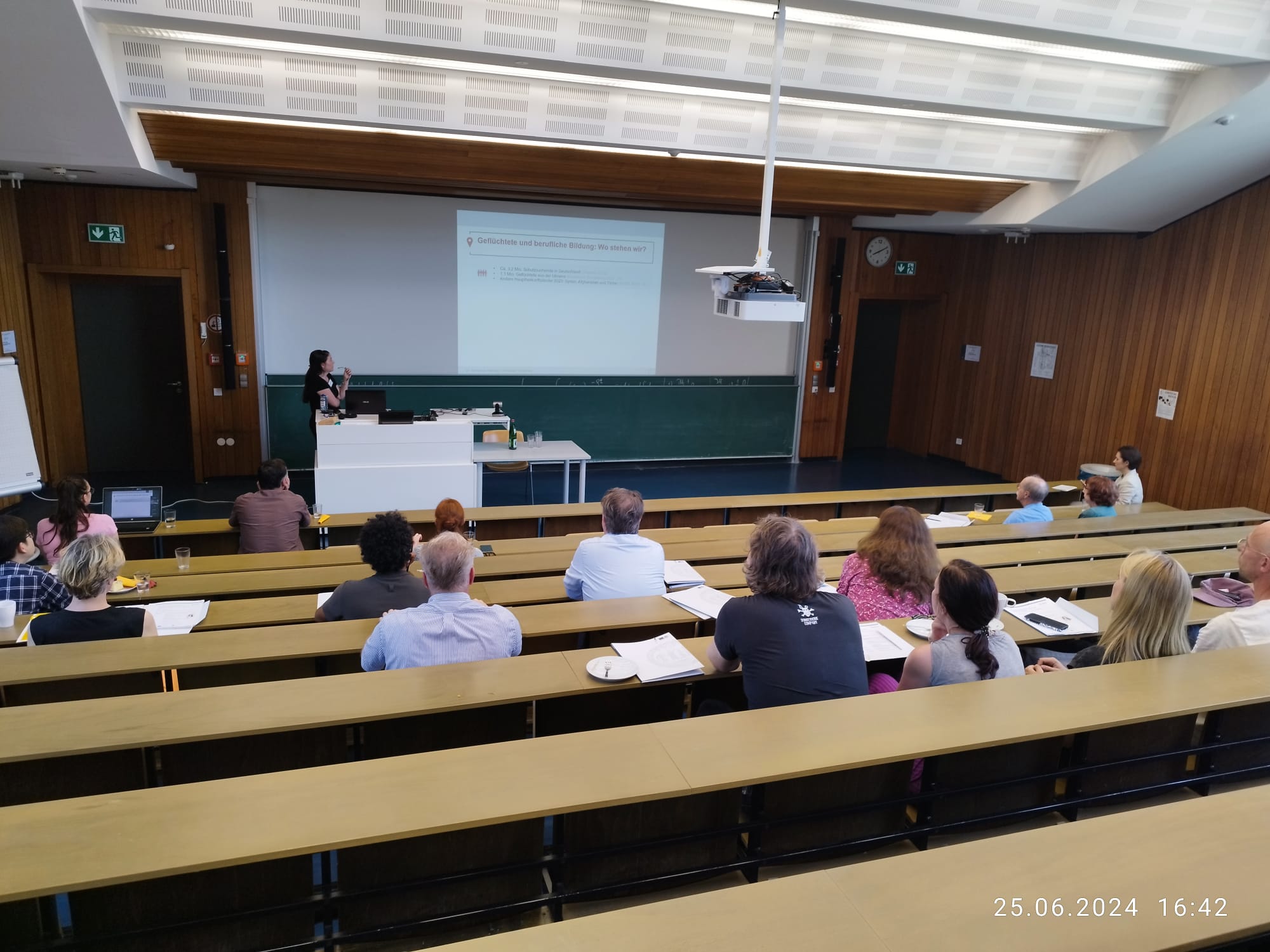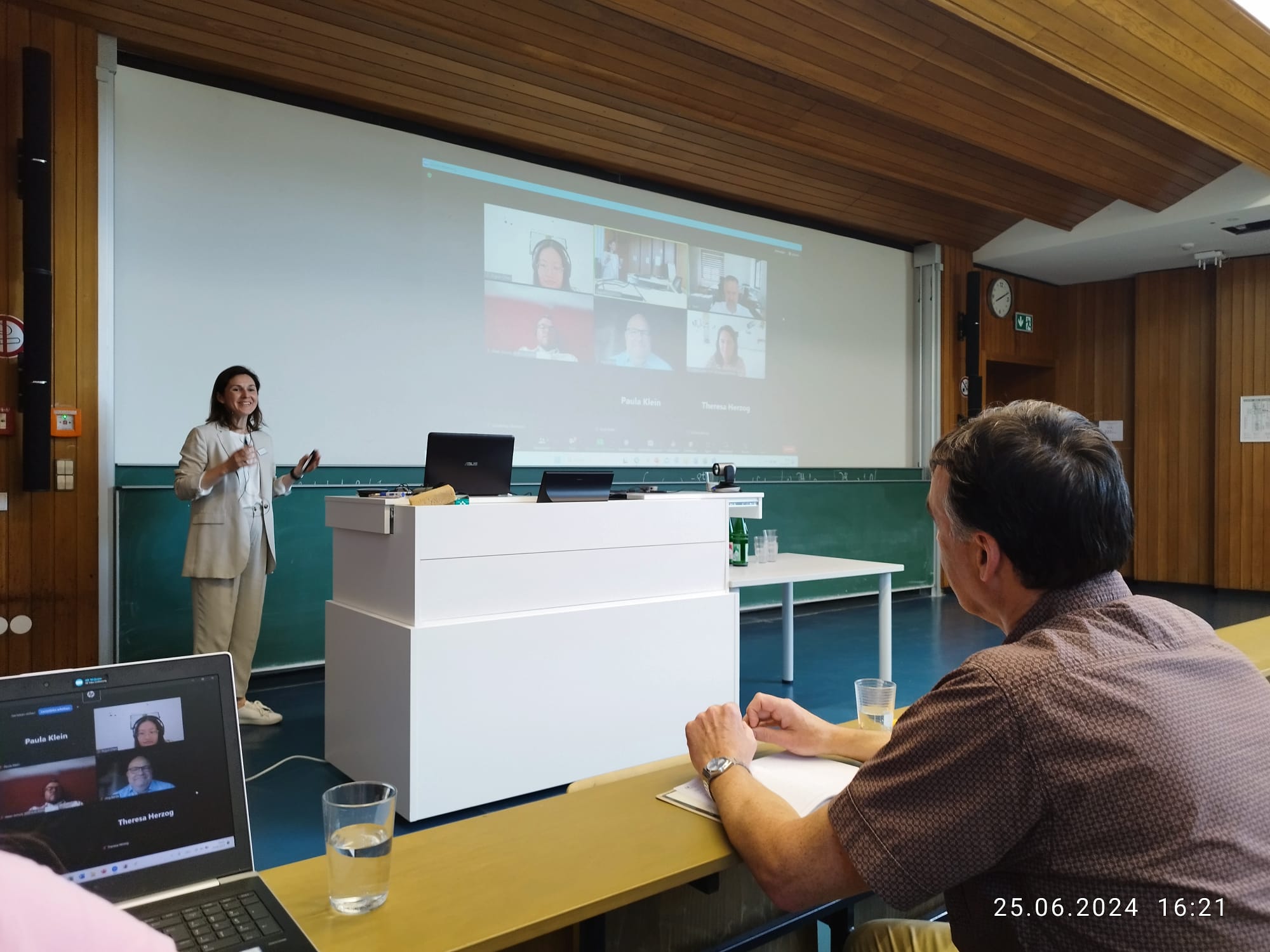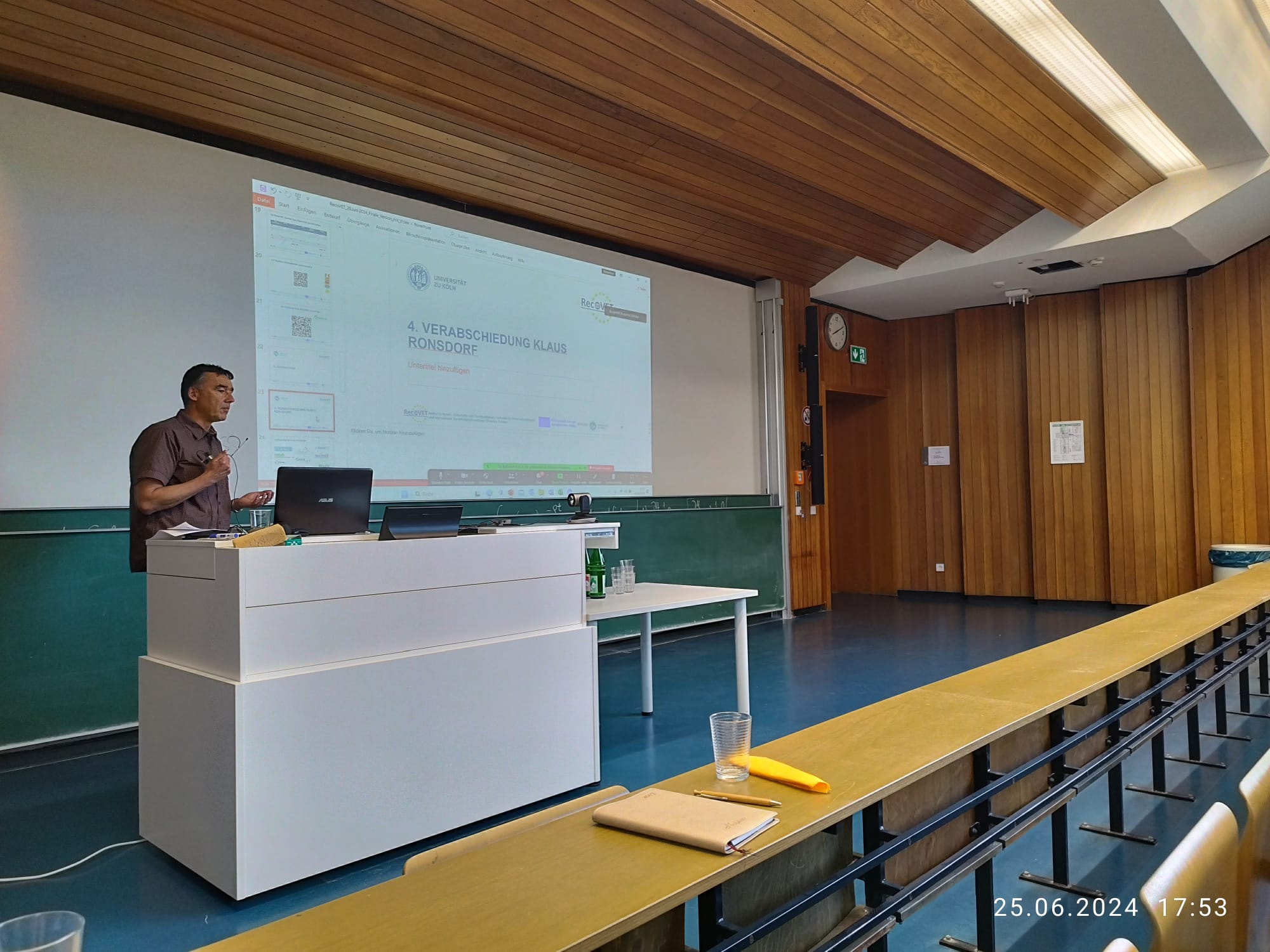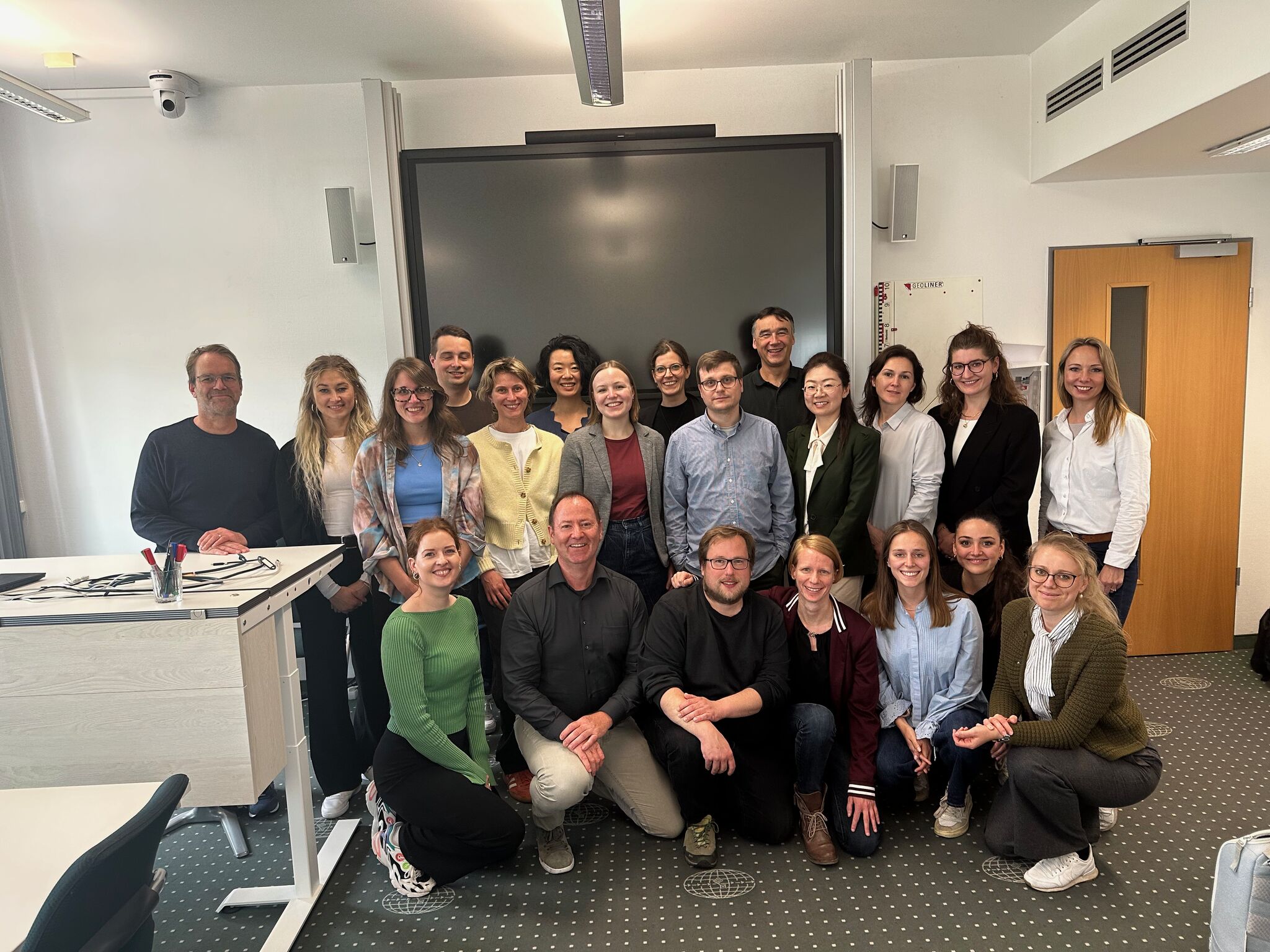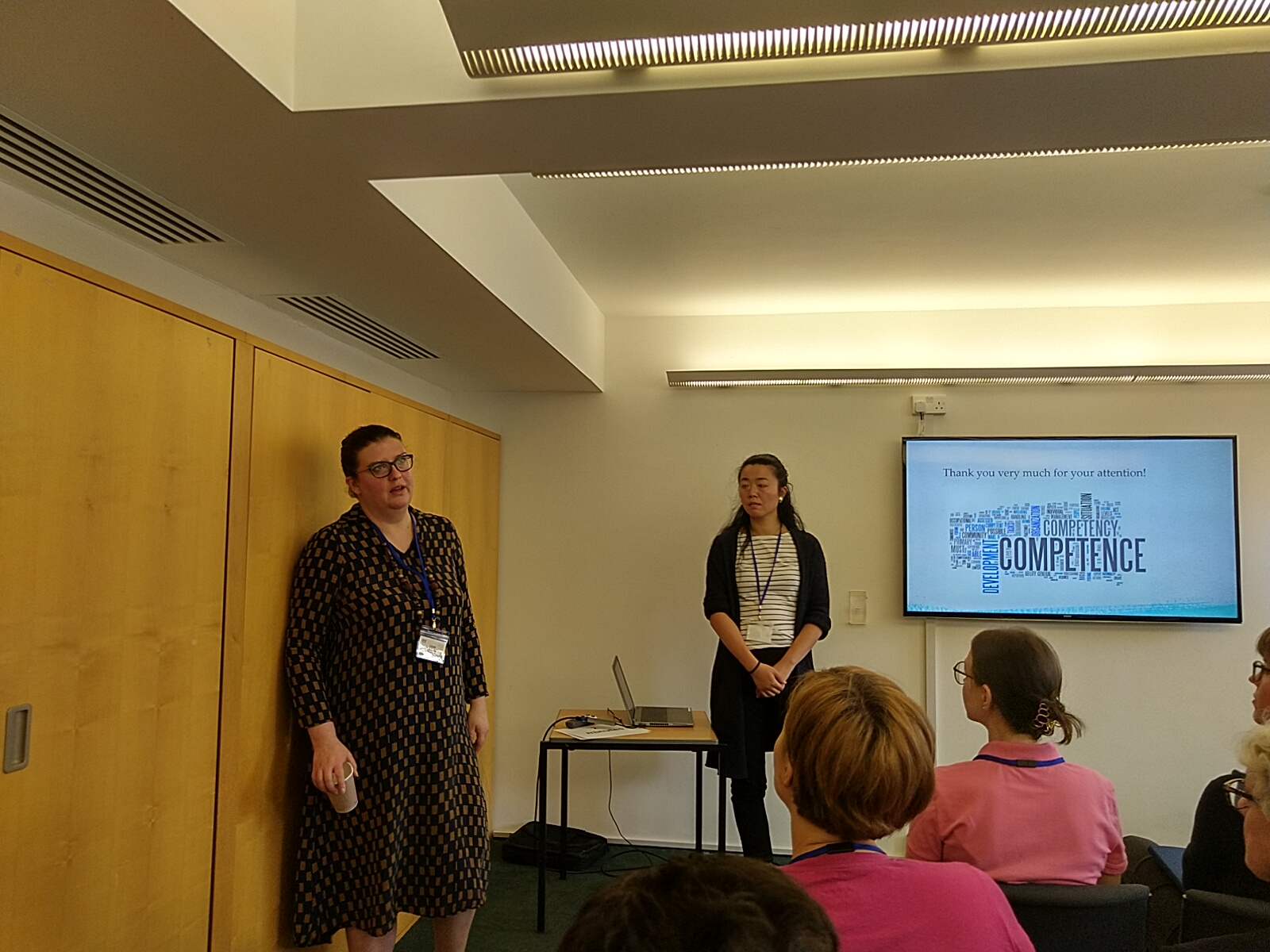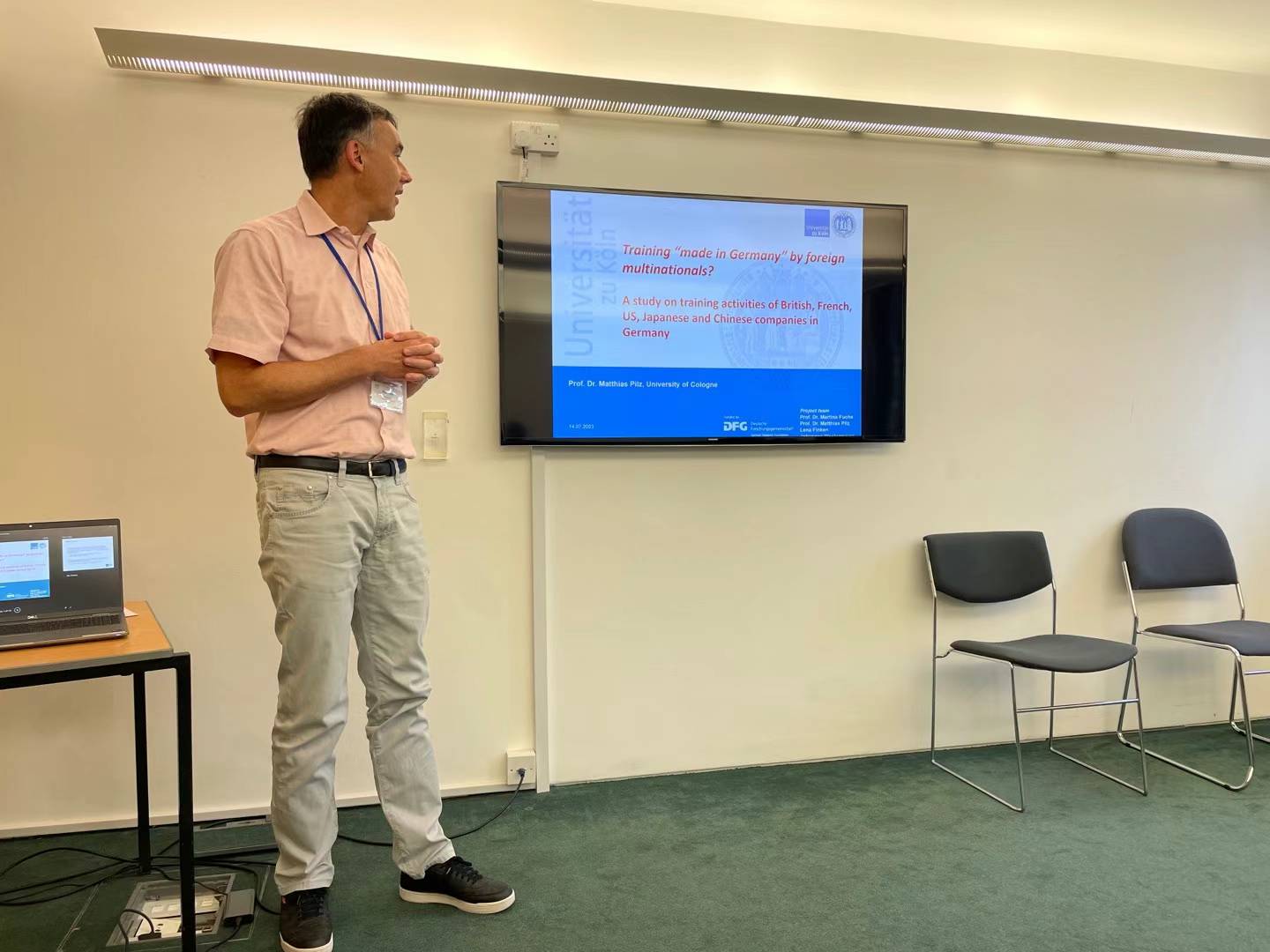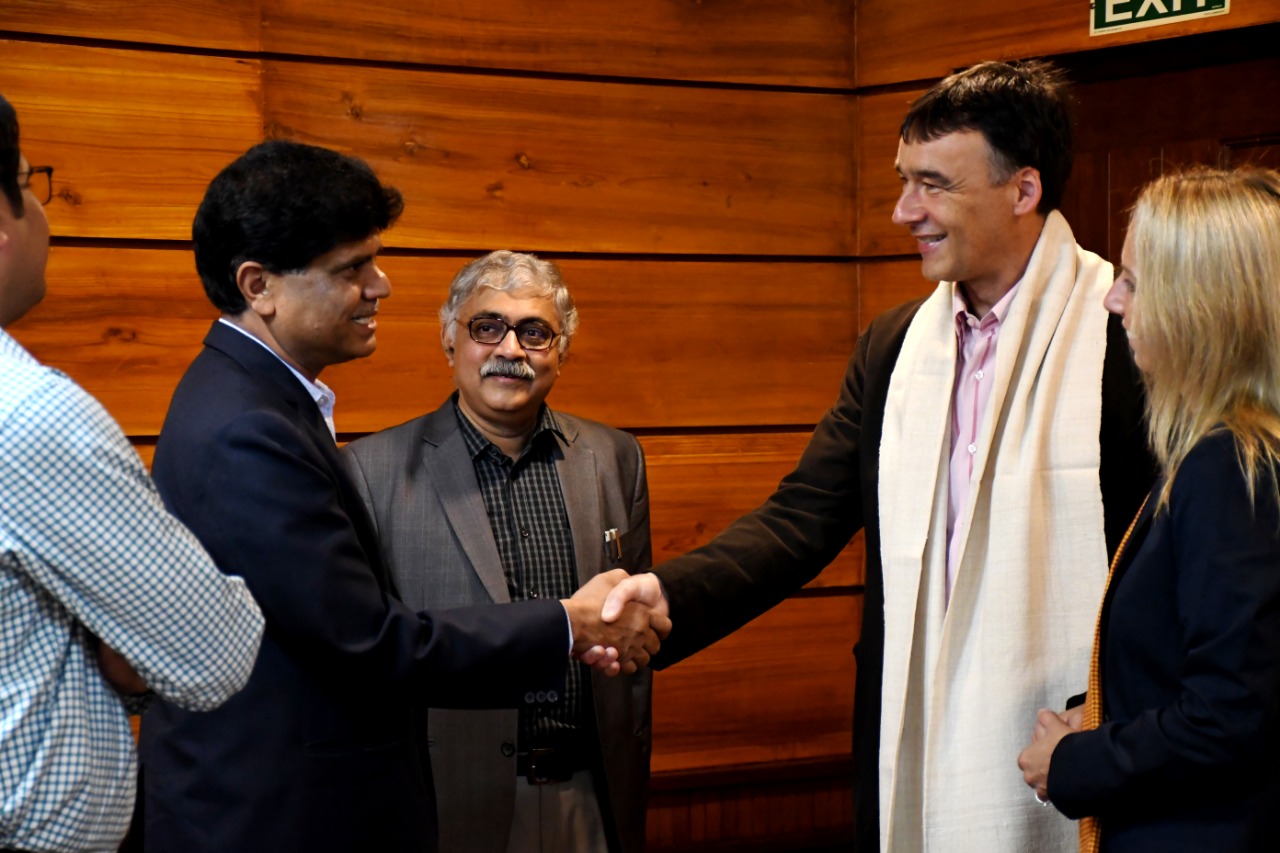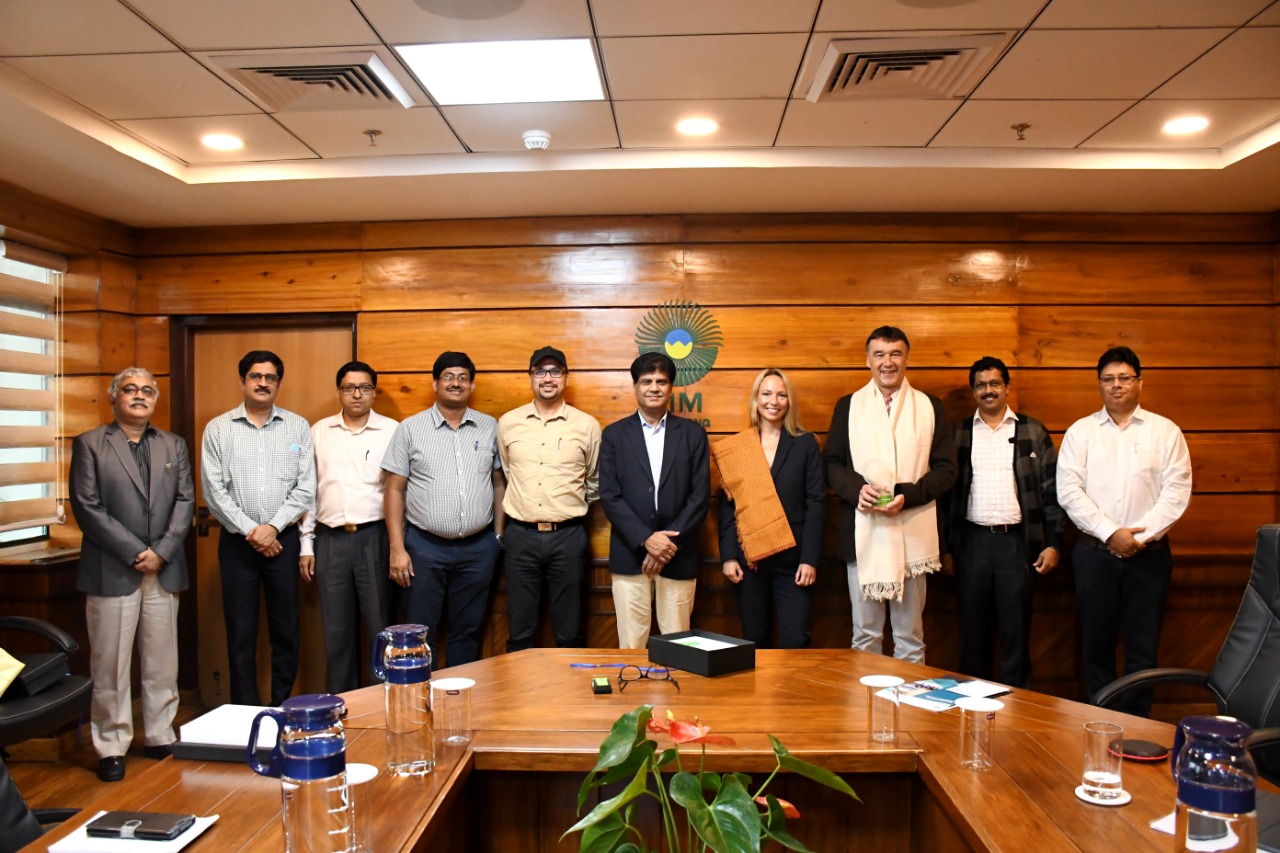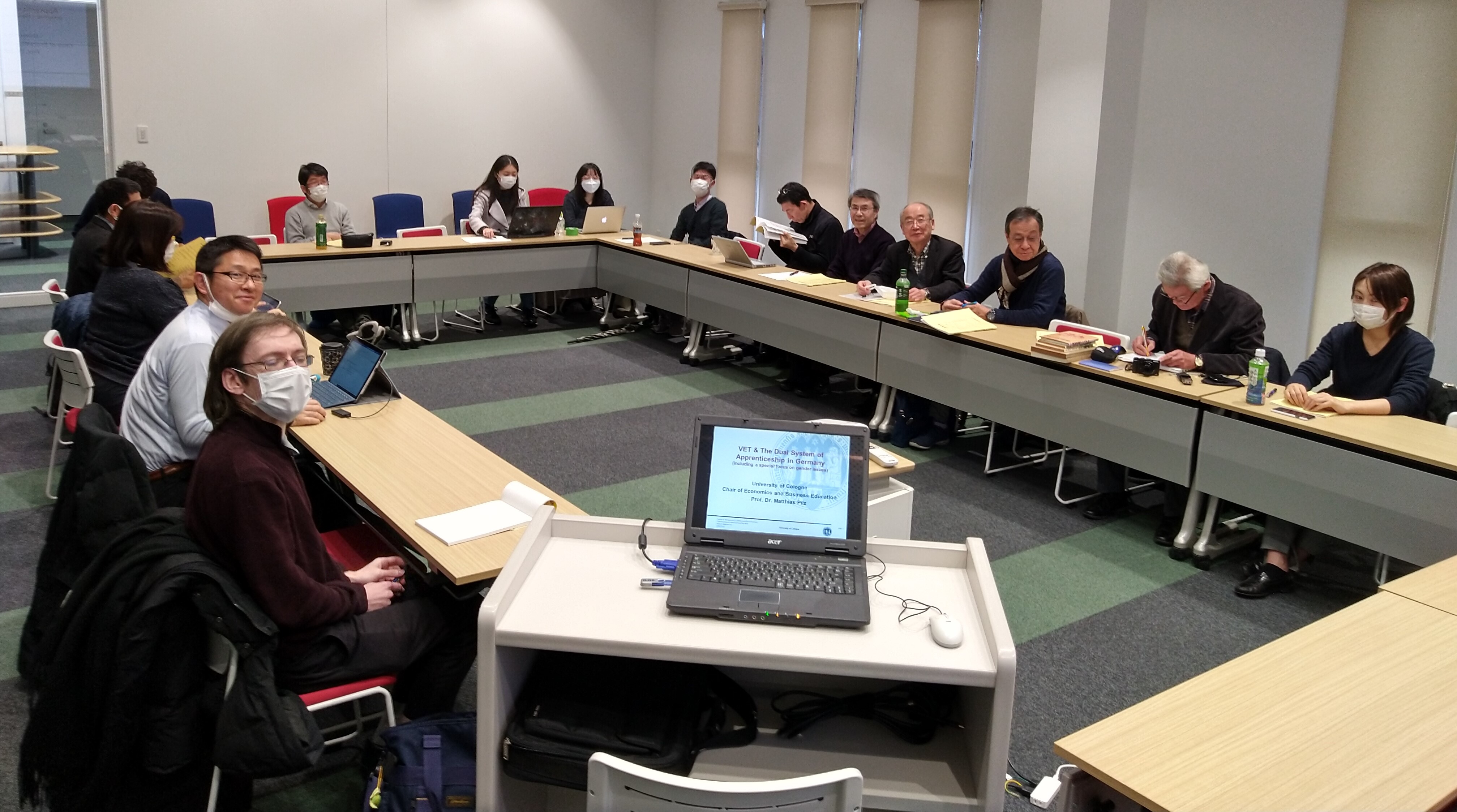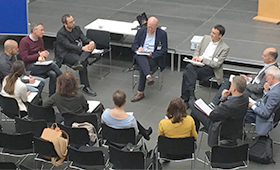The transition from university to employment in Japan - different perspectives in the context of demographic change
In February and March 2025, Prof Dr Matthias Pilz and Julia Dellori explored the transition from university to the employment system in Japan as part of two research projects. Both perspectives shed light on the topic in the context of demographic change.
As a visiting researcher at the German Institute for Japanese Studies (DIJ) in Tokyo, Prof Dr Pilz investigated current recruitment and training strategies of German subsidiaries in Japan. In this context, he also focussed on external contextual conditions, problems of strategy implementation and the exploration of internal logics of action.
Against the background of current developments in the Japanese transition system, Julia Dellori used interviews with Japanese students from various universities in Japan to analyse how they individually experience the transition from university to the employment system. The research stay was funded by a scholarship for doctoral students from the German Academic Exchange Service (DAAD), and the DIJ provided a workplace during her time in Tokyo.
Project TeC@ses at the conference "Hochschultage Berufliche Bildung" 2025
At the end of March 2025, G. R. E. A. T. took part in the conference ‘Hochschultage Berufliche Bildung’ 2025 in Paderborn, Germany. The Erasmus+ project TeC@ses was presented in the poster session.
This year, the conference focused on sustainability, digitalisation and equity. Perfectly placed, as the TeC@ses project is developing an online learning tool for vocational teachers to design and teach case studies, also incorporating their digital potential.
If you would like to stay up to date, you can subscribe to the newsletter “Case Studies & Online Learning".
Participation in the Annual Conference of the German Association for Social Science Research on Japan (VSJF) 2024
Last week, the German Research Center for Comparative Vocational Education and Training (GREAT) took part in the annual conference of the German Association for Social Science Research on Japan (VSJF), which was held in Berlin from 15 to 17 November 2024. This year’s conference theme was “Sustainability in Japan”, which was examined from the perspectives of economics, society, and politics.
As part of the Sociology/Social Anthropology, and Economics section, Prof. Dr Matthias Pilz presented the findings of a research project on recruitment strategies of Japanese companies in times of demographic change in Japan. This project was conducted in collaboration with Matthias Hennings (Kwansei Gakuin University) and Ralf Bebenroth (Kobe University).
The presentation was followed by an engaging discussion on the future development of Japan’s transition system against the backdrop of demographic changes.
Announcement of the conference Volume of the 4th International G.R.E.A.T. Conference “Informal Learning in Vocational Education and Training”
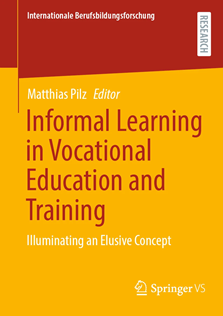
The conference volume contains selected papers from the 4th International G.R.E.A.T. Conference, which took place at the University of Cologne in September 2022. This book was initiated to fill a gap in the understanding of informal learning in the context of vocational education and training (VET). It does so by examining a wide range of aspects and different objectives, levels and locations of informal learning. The authors, selected from different parts of Europe as well as Japan, Australia, India and Bangladesh, contribute to the topic from different country perspectives. As such, this volume makes a unique contribution to the study of informal learning in VET.
You can find the conference volume here and the review of the book here.
Visit of Prof. Dr Stephen Billett from Griffith University in Australia
On October 23, the German Research Center for Comparative Vocational Education and Training (G.R.E.A.T.) welcomed Prof. Dr Stephen Billett as a guest researcher at the University of Cologne. Under the umbrella of the three focus questions ‘Why are vocational education systems often so different across nations?’, ‘What brings about changes to them?’ and ‘What constitutes a mature vocational system?’, he shared his expertise on the Australian vocational education system in a presentation at our institute.
Dr Stephen Billett is Professor of Adult and Vocational Education in the School of Education and Professional Studies at Griffith University, Brisbane, Australia and a National Teaching Fellow and Australian Research Council Future Fellow. After a career in garment manufacturing, he has worked as a vocational educator, educational administrator, teacher educator, professional development practitioner and policy developer in the Australian vocational education system and as a teacher and researcher at Griffith University.
The G.R.E.A.T. team would like to thank Stephen Billett for visiting our Institute and for giving us an insight into his exciting experiences and research.
Participation in the MP-INVET forum ‘Transfer of vocational training in the focus of VET research’
The meta-project 'MP-INVET – Research on the Internationalisation of Vocational Education and Training' was presented at the 2024 annual conference of the Section for Vocational and Business Education (BWP) at the Technical University of Dresden in its own forum entitled 'VET transfer in the focus of VET research'.
Professor Dr. Matthias Pilz participated in this forum as an expert and engaged in a discussion of current developments and perspectives in international VET research with the participants.
Presentations of the results of a study on the training activities of foreign multinational companies in Germany
The annual conference of the Section for Vocational and Business Education of the German Society for Educational Science (DGfE) took place in Dresden from September 16 to 18, 2024, under the theme “50 Years of the Future: Paradigms, Positions and Perspectives of Vocational and Business Education”. Prof. Dr. Matthias Pilz presented the results of a study on the training activities of foreign multinational companies in Germany. The presentation of the project results was followed by a lively discussion, in which the potential for integrating these companies into the dual training system in Germany was discussed in particular.
Research visit by Thanavit Limpavittayakul from the University College London in UK
From June 3 to July 12, 2024, Thanavit (Tar) Limpavittayakul from the Institute of Education (IOE), the Faculty of Education and Society at University College London, visited the German Research Center for Comparative Vocational Education and Training (G.R.E.A.T.). During this time, he gained practical insights into the vocational education and training system in Germany with a focus on teacher training and also actively participated in the life of the chair.
Thanavit Limpavittayakul is a PhD student of Prof. Dr David Guile from IOE (Faculty of Education and Society, University College London) and his research focuses on the two main areas of policy borrowing and teacher education within the VET system in Thailand.
The members of G.R.E.A.T. would like to thank Tar for the exciting exchange and wish him every success in his future research work.
Visit of an Egyptian delegation to the University of Cologne on July 9th 2024
At the invitation of the German Academic Exchange Service (DAAD), a high-ranking Egyptian delegation visited the University of Cologne on July 9th. On the occasion of the visit, Prof. Dr. Matthias Pilz gave a presentation on "Research on skill development, training and labor markets" in the presence of the Egyptian Minister of Higher Education and Scientific Research and other Egyptian representatives and reported on selected research projects of the G.R.E.A.T. Institute.
The reason for the trip and the aim of the Egyptian government is to expand education and research capacities in the higher education sector and to strengthen the employability of graduates in Egypt. Part of the strategy for pursuing these goals is both the establishment of Egyptian universities and the opening of new branches of foreign universities in Egypt in order to respond to the needs and current trends of the labour market through new academic programmes and specializations.
Panel discussion at The Japan Cultural Institute in Cologne on June 26, 2024 - “The transition from school to work in Japan and Germany in times of demographic change”
On Wednesday, June 26, 2024, the panel discussion on “The transition from school to work in Japan and Germany in times of demographic change” was hosted by The Japan Cultural Institute in Cologne (The Japan Foundation), in cooperation with the Chair of Business Education and International VET Research at the University of Cologne. Dr Peter-Jörg Alexander (University of Osnabrück), who moderated the event, began by highlighting the relevance of the topic and the connection between Japan and Germany, particularly in terms of demographics and the shortage of skilled workers. Apl. Prof. Dr Mikiko Eswein (RPTU Kaiserslautern-Landau) then presented the transition system in Japan, which was followed by a presentation of the German transition system by Prof. Dr. Pilz (University of Cologne). Prof. Dr. Bebenroth (Kôbe University) rounded off the presentations by linking the previous contributions of the Japanese and German experts to introduce the panel discussion.
Thanks to the lively participation of the audience with interesting questions and contributions on the topic, an exciting and lively discussion took place between experts and all those present.
The event was recorded and is publicly available here on the Youtube channel of the Japanese Cultural Institute Cologne.
Visit of Prof. Dr Ralf Bebenroth from Kôbe University in Japan
In June 2024, the German Research Center for Comparative Vocational Education and Training (G.R.E.A.T.) welcomed Prof. Dr Ralf Bebenroth as a guest researcher at the University of Cologne. During his stay at the institute, he enriched courses at the institute with lectures on the school and employment system in Japan. As a Japanese expert, he was also part of a panel discussion on the transition system in Japan and Germany, organized by The Japan Cultural Institute in Cologne (The Japan Foundation) in cooperation with the Chair of Business Education and International VET Research (University of Cologne).
Dr Ralf Bebenroth has been Professor of International Business at Kôbe University in Japan since 2005 and is affiliated with the Research Institute for Economics and Business Administration. He initially held lectures in Japanese and later taught International Business and related fields in English. Previously, Prof. Bebenroth spent two years as a DAAD postdoctoral fellow in Tokyo and then another two years as a Humboldt Research Fellowship holder in Osaka. Prof. Dr Bebenroth has now been living and working in Japan for almost 25 years. In addition to comparative research between Japan and Germany, Prof. Dr Ralf Bebenroth's research focuses in particular on corporate governance, human resource management, marketing and finance.
The G.R.E.A.T. team would like to thank Ralf Bebenroth for visiting our institute and sharing his exciting experiences and research.
Visit of Ass. Prof. Dr Trent Brown from Tokyo College, University of Tokyo
In June 2024, the German Research Center for Comparative Vocational Education and Training (G.R.E.A.T.) welcomed Ass. Prof. Dr Trent Brown as a visiting researcher at the University of Cologne. During his stay at the institute, Mr Brown gave a total of four lectures to Bachelor’s, Master’s and doctoral students, giving them an insight into his research on India and Japan. On the one hand, he reported on reforms in the field of vocational education and training (VET) in India with a special focus on the agricultural sector as well as on the informal sector of VET in India in the context of globalisation. On the other hand, his presentation on skill ecosystems from a conceptual perspective using the example of the silk manufacturing in Japan and agriculture in India provided an opportunity for discussion and a lively exchange with the audience.
Dr Trent Brown is Associate Professor at Tokyo College, University of Tokyo, where he convenes the Sustainablity and Society Research Group. Before, he worked in the School of Geography, Earth and Atmospheric Sciences at the University of Melbourne, Australia. His research focus is on contemporary India and Japan, food systems and agrarian change, skill development and skill ecosystems, craft production and sustainability.
The G.R.E.A.T. team would like to thank Mr Brown for his visit and the fascinating insights into his research in India and Japan.
Multiplier event of the RecoVET project on June 25, 2024
The multiplier event of the RecoVET project took place on Tuesday, June 25, 2024 at the Chair of Business Education and International VET Research.
Dr. Junmin Li, University of Cologne, opened the event with a welcome speech and explained how the RecoVET project started. This was followed by a keynote speech by Dr. Katharina Wehking, University of Osnabrück, on "Current perspectives on the integration of refugees in vocational education and training", which was insightful and inspiring for all participants. Ekaterina Schlüter, University of Cologne, presented the project results (online tool, handbook and toolbox) to the target group. The way in which the online training can be used was presented and discussed in detail. The event was attended by quality inspectors, educational specialists, representatives of the chambers of industry and commerce and municipal institutions that deal with young refugees. After a brief outlook, the event was rounded off by an exchange with experts from the fields of evaluation and education in a relaxed atmosphere. Thanks to the hybrid nature of the event, online participants were also able to fully contribute to the discussion.
Further information about the project at https://recovet.uni-koeln.de/en/ .
Annual meeting of the doctoral students in Bremen
On 15 June 2024 the annual meeting of the doctoral students from the University of Cologne, University of Bremen and University of Osnabrück took place at the Institute of Technology and Education (ITB) in Bremen. One doctoral student from each location presented their work. The meeting therefore offered diverse and in-depth insights into various research projects in the field of international vocational education and training and gave the opportunity for a valuable peer-to-peer exchange.
The following meeting next year will take place at our institute at the University of Cologne.
Board Meeting des G.R.E.A.T.
On 6th June 2024, the regular Board Meeting of the German Research Center for Comparative Vocational Education and Training (G.R.E.A.T.) took place in the institute. The board members were informed about the extensive activities and new projects of the research center. Besides Prof. Dr. Matthias Pilz, Julia Dellori, Julia Regel and Ekaterina Schlüter of the University of Cologne, the Board Members Birgit Thomann of the Federal Institute for Vocational Education and Training, Dirk Matter of the Indo-German Chamber of Commerce, Prof. Dr. Gregor Lang-Wojtasik of PH Weingarten and Dr. Balasubramanian Ramani of Niedersachen.next-initiative of the government of Lower Saxony took part in the meeting.
Panel discussion at The Japan Cultural Institute in Cologne on June 26, 2024 - “The transition from school to work in Japan and Germany in times of demographic change”
On Wednesday, June 26, 2024, The Japan Cultural Institute in Cologne (The Japan Foundation), in cooperation with the Chair of Business Education and International VET Research at the University of Cologne, will host a panel discussion on “The transition from school to work in Japan and Germany in times of demographic change”. The panel discussion will compare the transition from school to the world of work in Japan and Germany. Against the backdrop of the demographic development with shrinking birth cohorts, problems arise in both countries in the course of the transition process. The event therefore addresses a highly topical issue and presents the current transition situation in both countries and compares the institutions, processes and challenges.
Japanese and German experts in the field of transition from school to employment will provide insights into the various facets of this topic. There will then be an opportunity to exchange views and ideas in a discussion round, which will also respond to contributions from the audience.
The panel discussion will take place from 5 to 7pm at the Japanese Cultural Institute, Universitätsstr. 98, 50674 Cologne, and will be followed by a small reception offering the opportunity for informal exchange.
Further information on the event can be found here.
Multiplier event of the RecoVET project on 25 June, 2024
On Tuesday, 25 June 2024, the closing event of the RecoVET project will take place. The RecoVET project - "Recognition of Good VET practice for refugees" - dealt with the development of a concept for the external assessment and recognition of specific quality in the integration of people with refugee experience. The project results (online tool, handbook and toolbox) serve to raise awareness for the design of VET programmes for refugees and people with a migrant background.you can find out more about the project at https://recovet.uni-koeln.de/en/
The target group of the RecoVET event are people who work in educational institutions and in the field of vocational integration as well as evaluators and experts in educational quality. The event consists of presentations and the demonstration of project results and is rounded off by an exchange with experts from the fields of evaluation and education in a relaxed atmosphere.
The event will take place from 4:15 to 6:15 pm at the Institute for Vocational, Economics and Business Education, Herbert-Lewin-Straße 2, 50931 Cologne.
The programme can be found here.
Research visit by Julián Bell Sebastián from the University of Valencia in Spain
From 22.09. to 22.12.2023 Julián Bell Sebastián from the Department of Didactics and School Organisation of the Faculty of Philosophy and Educational Sciences of the University of Valencia visited the German Research Center for Comparative Vocational Education and Training (G.R.E.A.T.). During this time, he continued his participation in the Erasmus+ RecoVET project . He also carried out fieldwork as part of his research projects and actively participated in the life of the department.
Julián Bell Sebastián is a PhD student of Prof. Fernando Marhuenda Fluixá at the Department of Didactics and School Organisation and Dr. Carmen Carmona Rodríguez at the Department of Research Methods and Diagnosis in Education of the Faculty of Philosophy and Educational Sciences of the University of Valencia. He is also a member of the research group Culture, Diversity and Development (GIUV 2013-138) and Transitions (GIUV 2013-093), where he contributes as a collaborator.
Mr Bell's research focuses on the study of attitudes towards cultural diversity in vocational education and training as well as migration, governance and quality evaluation in vocational education.
He is also a member of the research group Culture, Diversity and Development (GIUV 2013-138) and Transitions (GIUV 2013-093), where he contributes as a collaborator.
The collaboration between G.R.E.A.T and Mr Bell has also resulted in a joint publication with Dr Junmin Li and Ekaterina Schlüter (Chair of Economics and Business Education): Li, J., Schlüter, E., Hautz, H., Bell, J., & Marhuenda, F. (2023). Quality management in vocational education and training: a reflection on educational governance in Austria, Germany and Spain. In V. Tūtlys, L. Vaitkutė & C. Nägele (Eds.), Vocational Education and Training Transformations for Digital, Sustainable and Socially Fair Future (pp. 265-272). VETNET. https://doi.org/10.5281/zenodo.7821912
The members of G.R.E.A.T. would like to thank Mr Bell for the exciting exchange and wish him every success in his future research work.
Presentation of the results of the DFG project "Multinational companies and the local knowledge base"
On 23 November 2023, the results of the DFG project "Multinational companies and the local knowledge base" were presented at the Federal Institute of Vocational Education and Training (BIBB). The Vice President and Director of Research, Prof. Dr Hubert Ertl, and the Head of the International Department, Birgit Thomann, welcomed Prof. Dr Matthias Pilz and M.Sc. Lena Finken in the presence of the thirty-five guests from BIBB. The presentation of the project results was followed by a lively discussion, in particular about the potential for integrating more foreign enterprises into the dual training system in Germany.
Visit of Professor Dr Franz Waldenberger from the German Institute for Japanese Studies
In the middle of November 2023, the German Research Center for Comparative Vocational Education and Training (G.R.E.A.T.) welcomed Prof Dr Franz Waldenberger. During his stay, Mr Waldenberger gave the Master's students an overview of his research on Japan in two lectures. On the one hand, Mr Waldenberger reported on the corporate careers of Japanese managers and the recruitment of young talent. On the other hand, Mr Waldenberger referred to comparative research and highlighted some differences between the Japanese and German employment systems. A lively discussion among the students rounded off the presentations.
Prof Dr Franz Waldenberger is an economist and director of the German Institute for Japanese Studies based in Tokyo. He is also Professor of Japanese Economics at the Ludwig Maximilian University of Munich. His research focusses on the Japanese economy and corporate governance. He is currently focussing on Japan's start-up ecosystem and the associated fundamental issues of digital transformation.
The German Research Center for Comparative Vocational Education and Training (G.R.E.A.T.) would like to thank Mr Waldenberger for his visit and the fascinating insights into Japanese culture and the Japanese education and employment system.
Special issue on "Informal learning in vocational education and training" in the International Journal of Training and Development
We are pleased to announce that you can now find the special issue of the IJTD on "Informal Learning in Vocational Education and Training" (2023, Volume 27, Issue 3-4) on the website of Wiley, London. Seven of eight contributions are available as open access.
The articles published here were selected by the editors of the IJTD from a large number of papers presented at the "4th International G.R.E.A.T. Conference" on "Informal Learning in VET" in September 2022 at the University of Cologne.
The selection of the contributions represented in this special edition was based on the criteria of quality, innovative perspective as well as relevance in the context of vocational education and training. The eight contributions published here cover a broad spectrum of aspects of informal learning and encompass different country contexts as well as different levels, goals and locations of informal learning.
New publication “Similar or Different Training Cultures? German and Chinese Companies in Their Home and Host Countries” is selected for the Journal "Societies" as the Cover Story
For internationally producing companies, training and recruiting skilled workers is particularly challenging. At various international locations, companies often encounter a “skills ecosystem” that differs to a greater or lesser extent from that of the home country. This article considers this problem and examines German companies in Germany and China and, conversely, Chinese companies in China and Germany. Specifically, it examines (1) how the training cultures of companies differ between the home country and abroad, (2) which influencing factors determine the training cultures realized in each case, and (3) what influence the respective nationally prevailing skills ecosystems specifically exert. The findings from these four perspectives document that German companies in Germany use the formal vocational training system of dual training, whereas German companies in China are strongly influenced by the local training culture of in-company learning. Moreover, Chinese companies in China also use this training, and only cooperate to a limited extent with the formal school-based vocational education and training system. The findings show that Chinese companies in Germany do not adopt the dual training system used in Germany. This article analyses these results and discusses the reasons behind them, drawing of a distinction between institutional logic and internal logic. The article (open-access) may be found in the current issue (Vol. 13, Issue 5 (May 2023)) of the international journal of sociology “Societies “ or here.
Participation in the JVET Conference
From Thursday, 13th until 15th of July 2023, the 15th the Journal of Vocational Education and Training (JVET) hosted a conference that brought together leading experts, educators, and researchers from around the globe. The event, held at Keble College in Oxford, England, witnessed a diverse range of presentations, discussions, and valuable insights into the field of vocational education and training.
JVET invited two distinguished experts in the field. Nandini Gooptu and John Buchanan took the stage as keynote speakers, sharing their profound insights and expertise, and leaving a lasting impact on the audience. Another highlight of the conference was the celebration of 75th anniversary of JVET from its beginnings to becoming a reputable platform for disseminating groundbreaking research in the field, JVET has played a pivotal role in shaping vocational education globally.
As well the team of Chair of Economics and Business Education from the University of Cologne has contributed to this inspiring event. Prof. Dr. Matthias Pilz moderated several sessions and contributed with his own presentation, sharing the latest research findings and offering a unique perspective on a study on training activities of British, French, US, Japanese and Chinese companies in Germany.
Dr. Junmin Li's presentation featured a collaborative effort with Elisabeth Knight from Victoria University, Australia elaborated the Anglo-saxony and German concepts of vocational competence and competency in context of policy transfer.
The exchange of ideas and experiences throughout the conference laid a strong foundation for future collaboration and research, ensuring that vocational training remains responsive to the evolving needs of society.
Research visit by Professor Dr. Orr from the University of Huddersfield in England
From 28th November to 09th December 2022, Professor Dr. Orr visited the German Research Center for Comparative Vocational Education and Training (G.R.E.A.T.). During his stay he gave, among other things, lectures for students of the Master's programme "Business Education" and provided insights into his research on VET policy in England, subject-specialist pedagogy in VET teaching and the training of teachers in England. He also chaired a doctoral colloquium in which current developments of qualifications in the English vocational training landscape were discussed.
Prof. Dr. Kevin Orr is Professor of Work and Learning and Associate Dean (Teaching and Learning) at the University of Huddersfield. He also brings extensive experience in teaching at Further Education Colleges and specifically in training future teachers. He publishes on various topics, including vocational education and training, teacher education, professional development and quantitative research methods in educational research.
The cooperation between the German Research Center for Comparative Vocational Education and Training (G.R.E.A.T.) was also strengthened through individual discussions with staff members about current research projects.
The members of G.R.E.A.T. in Cologne would like to thank Professor Dr. Orr for the exciting insights. We are looking forward to further exchanges.
Research visit by Professor Nokelainen from Tampere University in Finland
From 10th October to 21st October 2022, Professor Nokelainen visited the German Research Center for Comparative Vocational Education and Training (G.R.E.A.T.). During this time, he shared comprehensive insights into his research in Finland with students of the Master's programme "Business Education". Additionally, he chaired a doctoral colloquium, initiating a lively discussion on his research results, but also on the doctoral students' own research.
Prof. Dr. Petri Nokelainen is a full professor at Tampere University in Finland, but also holds the position as an adjunct professor at the University of Helsinki, Finland and Tallinn University, Estonia. In addition, Prof Nokelainen has extensive and long-standing experience through his position as Head of the Professional Growth and Learning Research Group. He publishes on the topics of Engineering Education, Regulation of Learning, Emotions, Active Learning, Workbased Learning and Professional Growth.
The cooperation between the German Research Center for Comparative Vocational Education and Training (G.R.E.A.T.) and Professor Nokelainen has already existed for several years. In the past, a joint article with Dr Junmin Li (Chair of Economics and Business Education) was published: Pylväs, Laura; Li, Junmin; Nokelainen, Petri (2021), Professional Growth and Workplace Learning. In: Harteis, C., Gijbels, D., Kyndt, E. (eds) Research Approaches on Workplace Learning. Professional and Practice-based Learning, vol 31. Springer, Cham. (pp 137–155) https://doi.org/10.1007/978-3-030-89582-2_6
The members of G.R.E.A.T. in Cologne would like to thank Professor Nokelainen for the exciting insights. We are looking forward to further exchanges.
Memorandum of Understanding: Indian Institute of Management Shillong
The German Research Center for Comparative Vocational Education and Training (G.R.E.A.T.) is pleased to announce a Memorandum of Understanding (MoU) with the Indian Institute of Management (IIM) Shillong, newly signed in August 2022. The MoU allows a regular exchange of scholars, faculty members and information to enhance research and mutual understanding between both institutions. More information about the cooperation with the IIM and other current activities of G.R.E.A.T. in India can be found here.
New publication on how the dual system is dealing with the Corona pandemic
The impact of the Corona pandemic was also evident at the training market, not at least because of the close links between the dual system and the economy. At the same time, school and company closures as well as strict hygiene regulations led to training activities being temporarily interrupted or severely restricted. In order to still ensure the start or continuation of training within the dual system, it was necessary for the responsible actors to act quickly. However, since the dual system is a collective training model with a high degree of complexity, the question arises to what extent such a complex system is capable of acting in the short term.
These and other questions are explored in the recently published article "Collective Skill Formation Regimes in Times of Covid-19: A Governance-Focused Analysis of the German Dual Training System", which was developed at the Chair of Economics and Business Education. The article (open-access) may be found in the current issue (Vol. 9, No. 2 (2022)) of the „International Journal for Research in Vocational Education and Training“ or here.
Prof. Dr. Matthias Pilz: „Most Productive Author“
In the study by Gessler, Nägele & Stadler (2021), a "scoping review" or "bibliometric mapping analysis" was carried out for the research field at the boundary between "learning and work For this purpose, a total of 5,474 peer-reviewed publications were taken into account, which were published between 2011 and 2020 and are listed in the Scopus database. The focus of the evaluation and structuring was, among other things, on the most frequently used keywords (e.g., the clusters "workplace learning", "apprenticeships", "teacher-training" etc.), the most frequently cited papers and authors as well as existing "collaborative networks" between countries, journals and authors. With a number of 28 publications between 2011-2020, Prof. Dr. Matthias Pilz was identified as the "most productive author" in this study. Of his papers, his typology approach in the context of international comparative VET research was cited most frequently. The study by Gessler, Nägele and Stadler was published in a special issue of the International Journal for Research in Vocational Education and Training and is available here (open access).
Prof. Dr. Matthias Pilz at the 8th International Conference of Research in Vocational Education and Training in Stockholm
From 11-13 May 2022, the 8th International Conference of Research in Vocational Education and Training took place in Stockholm, in which also Prof. Dr. Matthias Pilz participated. In his contribution "Training in a dual mode: Cooperation structures and procedures in actors' networks in Mexico", Prof. Dr. Pilz presented initial findings from the "DualReg" project. Further information on the conference (e.g., Book of Abstracts) can also be found on the conference website.
Call for Papers - 4th International GREAT Conference
We are pleased to announce that the 4th International Conference of the German Research Center for Comparative Vocational Education and Training (G.R.E.A.T.) will trake place from 28.-30. September 2022 in Cologne, Germany.
The conference will deal with current issues and findings within the context of informal learning in vocational education and training (VET). Therefore, it is a great pleasure for us to invite you to submit a conference abstract by the 14th of February 2022. For more information, please have a look at the Call for Papers.
Prof. Dr. Matthias Pilz as a speaker at a joint webinar by the OECD and the Bertelsmann Stiftung
Megatrends such as digitalisation, globalisation and demographic change are leading to sustainable changes in the world of work. In order to secure the employability of workers in the future, flexible forms of continuing education and training are becoming increasingly relevant. Against this backdrop, the OECD and the Bertelsmann Stiftung organised a joint webinar on 11.01.21 on the topic of "Flexible qualification for the future of work: opportunities for career advancement and securing skilled workers" to discuss possible consequences for shaping the German landscape of continuing vocational education and training. Referring to experiences as well as evidence from the international context, Prof. Dr. Matthias Pilz together with Alexander Höbl (Austrian Federal Ministry for Digitalisation and Business Location) and Dr. Thomas Kruppe (Institute for Employment Research) participated in a panel discussion that dealt with questions of the performance of flexible qualification approaches. A recording of the webinar and further information can be found here. For the recording of the panel discussion with Prof. Dr. Pilz, please watch the video from minute 30:45.
Guest lecture by Prof. Dr. Matthias Pilz and Prof. Dr. Shinji Sakano as part of the German-Japanese scientific cooperation
To mark the 160th anniversary of German-Japanese relations and the close academic exchange between the two countries, the University of Bonn, the University of Cologne and the Japan Foundation Cologne are jointly hosting an online lecture series in the summer semester of 2021 on the results of current and joint research from a wide range of disciplines, which will also be reflected against the background of societal developments in Germany and Japan. Together with Prof. Dr. Shinji Sakano from Tamagawa University, Prof. Dr. Matthias Pilz gave a lecture on "The transition from the education system to the employment system: Japan and Germany in comparison" on 05.05.2021. The focus was particularly on the structures and regulatory mechanisms in the education and employment systems of the respective countries, which were examined and compared in their respective contexts. A video of the lecture and the subsequent discussion is now available online. Further information and dates for the lecture series within the framework of the German-Japanese academic cooperation can be found here.
Special Issue of the “Kölner Zeitschrift für Wirtschaft und Pädagogik“ now published
In May 2021, a new issue of the “Kölner Zeitschrift für Wirtschaft und Pädagogik” was recently published. This issue focuses on the field of international comparative VET research and presents initial findings on the research projects conducted at GREAT within the framework of the BMBF funding line "Internationalisation of Vocational Education and Training". A first insight into the Special Issue can be found here.
Publication of the first issue of the International Journal of Training and Development (IJTD) with Matthias Pilz as new Editor-in-Chief
We are very pleased to inform you that the first issue of the IJTD under the newly formed Editorial Board is now published. Since July 2020, the journal has been edited by Prof. Dr. Matthias Pilz as the new Editor-in-Chief as well as Prof. Kothandaraman Kumar (Indian Institute of Management Bangalore, India), Ass. Prof. Dr. Jun Li (Tongji University, China), Ass. Prof. Dr. Jay Plasman (Ohio State University, USA) and Prof. Dr. Volker Wedekind (Nottingham University, UK) as Associate Editors.
The IJTD has a multidisciplinary orientation and focuses, among other aspects, on economic and political developments as well as scientific approaches and findings in the context of initial and continuing vocational education and training or training activities. With its claim to high-quality conceptual or empirical research, the journal's central objective is particularly to promote an international dialogue on the topic of "vocational education and training" and to strengthen cooperation between research, policy and practice.
The current issue can be found on the website of Wiley, London.
New publications in the context of export of vocational training
The export or transfer of German dual vocational training remains a highly relevant topic. Despite the large number of transfer projects and approaches, only few empirical findings are available in this area. We are therefore pleased to be able to mention two new publications in this context:
Faßbender, U. & Pilz, M. (2020): Merkmale dualer Berufsausbildung in den internationalen Angeboten deutscher Bildungsanbieter. Journal Of Technical Education (JOTED) 8(2), pp. 26-45. You can find the article on the JOTED homepage [German Language only].
Bakırcı, B. & Pilz, M. (2019). "Eigentlich bin ich ein bisschen dazu gekommen wie die Jungfrau zum Kind!" Zum Professionsverständnis von deutschen Berufsbildungsexperten im Ausland. Tertium Comparationis - Journal für International und Interkulturell Vergleichende Erziehungswissenschaft 25(1), 45-70. You can find this article here [German Language only].
Prof. Dr. Matthias Pilz as new Honorary Professor at the University of Nottingham
For the next three years (from August 2020), Prof. Dr. Matthias Pilz has been appointed as the new Honorary Professor at the School of Education at the University of Nottingham. With this award, the University of Nottingham aims to attract proven experts from the fields of vocational training, business and industry to provide external input for teaching and to carry out joint research projects. In the longer term, the cooperation between the parties involved and the universities in particular shall be strengthened.
Prof. Dr. Matthias Pilz as new Editor-In-Chief of the "International Journal of Training and Development"
Since July 2020 Prof. Dr. Matthias Pilz is the new Editor-In-Chief for the "International Journal of Training and Development" (IJTD). With a focus on the latest international developments and scientific knowledge in the field of vocational education and training, the IJTD includes various research disciplines. The publications of the IJTD deal with a wide range of issues within vocational education and training and related fields of education, such as current approaches and findings in initial and continuing training practice as well as political and strategic lines of development in the field of vocational education and training or training activities. With a multidisciplinary and internationally oriented approach as well as various empirically oriented publications, the journal's primary objective is to promote international dialogue to advance and strengthen vocational education and training worldwide. Due to the given scope, the Journal is therefore not only addressed to the scientific community, but also to relevant and interested actors from economy and politics. The IJTD is published annually with a total of four issues. Further information about the IJTD as well as a complete overview of the publications can be found on the pages of the Wiley Online Library.
New publication in the "International Vocational Training Research" series
Another volume in the "International Vocational Training Research" series edited by Prof. Dr. Matthias Pilz, Prof. Dr. Dietmar Frommberger and Prof. Dr. Dr. h. c. Michael Gessler has now been published in time for the end of May 2020. The new volume entitled "Comparative Vocational Education Research" was edited by Prof. Dr. Matthias Pilz and Dr. Junmin Li and refers explicitly to the discipline of international comparative vocational education training research. In addition to presenting further theoretical developments within the discipline, the aim of the volume was also to present methodological approaches and excellent research findings. As a result, this is a volume that offers comparative studies in vocational education and training a special place and contains a large number of scientific contributions by world-renowned vocational training researchers. A short overview of the book is also provided by the contribution of Prof. Dr. Dr. h.c. Michael Gessler, which you can find here.
Digitalisation - What about data protection in schools and what do teachers know about it?
During her internship semester and in her study project, the former Master student Ms. Anna Kruse pursued the question of what teachers at a vocational school know about the DSGVO, which has been in use since 2018. A summary of her study and its results can be found in the new issue of the "Fachmagazin für den Datenschutz" (from p. 74) of the Berufsverband der deutschen Datenschutzbeauftragten (BvD). The study project was carried out in the summer semester 2019 under the supervision of Prof. Dr. Matthias Pilz and offers exciting insights into the topic "Data Protection at Vocational Colleges". Ms. Anna Kruse herself successfully completed the master's degree course "Teaching at vocational colleges" in spring 2020 - we congratulate her on her publication and wish her all the best for her further professional future.
Prof. Dr. Matthias Pilz on field research in Japan
In the time from 10.02.-24.02.2020, Prof. Dr. Matthias Pilz is on field research in Japan. This research visit is funded by the "Japan Society for the Promotion of Science". In the context of several interviews with school actors such as teachers, he is investigating the attitude of teachers towards vocational training. Several visits to schools, universities and companies are organized nationwide. On 10.02.2020, he already visited the Toyohashi Technical High School and interviewed the headmaster as well as other trainers regarding the motivation of the students, the satisfaction with school life, the employment status and the professional biography of the teachers - a Japanese article about this visit can be found here. Furthermore, he has already visited the "Aichi High School of Technology and Engineering" - There he met both Prof. Etsuo Yokoyama, who works at Nagoya University and has been a visiting fellow at the Department of Economic and Business Education, and the headmaster Mr. Yamaguchi Naoto. Similar surveys have already been conducted in India and China. In addition, Prof. Dr. Pilz also gave a lecture on vocational training in Germany at Nagoya University. A short report on the research visit of Prof. Dr. Matthias Pilz can be found here.
Board Meeting of G.R.E.A.T.
On 27th December 2019, the regular Board Meeting of the German Research Center for Comparative Vocational Education and Training (G.R.E.A.T.) took place in the rooms of the institute. The board members were informed about the extensive activities and new projects of the research center. Besides Prof. Dr. Matthias Pilz, Dr. Junmin Li, Julia Regel and Sebastian Schneider of the University of Cologne, Dr. Volker Wedekind as guest of the University of Nottingham as well as the Board Members Tilman Nagel of GIZ and Shyamal Majumdar of Unesco-Unevoc, took part in the meeting.
Research visit of Dr. Volker Wedekind from the University of Nottingham
From 18.11. to 29.11.2019 Dr. Volker Wedekind visited the Institute for Vocational, Economic and Social Education. During this time, he gave individual courses for students of the master's programme "Business Education" and also chaired a colloquium for doctoral students. During these courses, he was able to provide students and doctoral students with interesting insights into his research work and to stimulate discussion. He was also available as a contact person for individual student theses focusing on the British and South African vocational training systems and was able to advise doctoral students on their research projects.
Dr. Wedekind is currently working at the University of Nottingham in the School of Education as deputy director, but has also spent a large part of his career so far in South Africa, so that he is distinguished by his great expertise for both the UK as well as the South African vocational training system. His current research interests include the relationship between education, social policy and economic development as well as vocational training practices and their differences with other forms of education. In the future, Dr. Volker Wedekind will focus on the field of migration and the associated challenges for vocational education and training. The staff of the institute are looking forward to further visits by Dr. Wedekind.
Research Workshop on "international comparative vocational education and training research"
On 14 November 2019, the Chair of Economics and Business Education at the University of Cologne hosted an all-day research workshop on international comparative vocational education and training research. In addition to the staff of Prof. Dr. Pilz and international guests, other colleagues from the chairs of Prof. Dr. habil. Frommberger of the University of Osnabrück and Prof. Dr. Dr. h. c. Gessler of the University of Bremen, attended the research workshop.
The fascinating lectures, which dealt with the most diverse facets and questions within the internationally comparative vocational training research, stimulated fruitful discussions as well as a professional exchange. In addition, the workshop participants had the opportunity to exchange views on their current research projects and questions. All in all, it was an extremely enriching day for all participants, which will be repeated in the near future.
Guest Lectures by Prof. Dr. (em.) Roger Harris from the University of South Australia
The Chair of Economics and Business Education of Prof. Dr. Matthias Pilz was pleased to welcome Prof. Dr. (em.) Roger Harris from the School of Education (University of South Australia) from the 4th to the 15th of November 2019. Prof. Dr. Harris is a renowned scientist in the field of international comparative vocational education and training research and has published numerous journal and book articles in the field of vocational education research and teacher training. Despite his retirement, he remains committed to his field of research and was a guest at the Chair of Business and Social Education in July 2016, where he provided students and staff at the institute with interesting insights into the Australian vocational training system. In September 2018, he also took part in the G.R.E.A.T. Conference on International Comparative Vocational Education and Training Research.
During his current stay, Prof. Dr. Harris continued to share practical tips, experiences and insights into his research work and the Australian vocational training system with both the Master's students and the Institute's staff through several courses. Furthermore, he participated as an external guest in the workshop "International Comparative Vocational Education and Training Research".
Prof. Dr. Matthias Pilz at expert talks in Berlin
Foto: Dr. Maren Jasper-Winter
The further development of vocational education and training is a pressing political issue, as demonstrated by the work of the current Enquete Commission "Berufliche Bildung in der digitalen Arbeitswelt", among other things.
Following a meeting of the Enquete Commission, Prof. Dr Matthias Pilz held an in-depth expert discussion with Dr Jens Brandenburg, Member of the German Bundestag, spokesperson for studies, vocational training and lifelong learning and spokesperson for LGBTI issues, and subsequently with Dr Maren Jasper-Winter, Member of the Bundestag, spokesperson for vocational training for the Free Democrats' parliamentary group in the Berlin House of Representatives, among others
Research visit of Professor Etsuo Yokoyama (Nagoya University Japan)

Prof. Yokoyama was a guest at the Institute for Vocational, Economic and Social Education from 24.06.-05.07.2019. Through various lectures and numerous discussions he was able to provide insights into his field of research and into the Japanese VET system. Besides he showed large interest in the German vocational education system, he visited the Federal institute for vocational training in Bonn and the Berufskolleg Alfred Müller Armack in the Südstadt of Cologne.
Prof. Dr. Yokoyama is based at the Institute for Educational Science at the Graduate School of Education and Human Development at Nagoya University. He is a renowned scientist in the field of international comparative vocational education and training. One of his central research areas is in the field of handicrafts. Among other things, he has dealt with vocational training in the craft trades in the Scandinavian countries and their influence on other countries. Another focus is on domestic vocational education and training and the origins and history of Japanese crafts and trades as well as women's education in Japan.
Participation in the eleventh meeting of the Enquete Commission
On Monday, 3 June 2019, the Enquete Commission met for the eleventh time and held a public hearing on the topic of "Beruflichen Bildung in der digitalen Arbeitswelt". Experts from politics and research had a lively exchange on the current state of digitalisation in the world of work in an international comparison. Prof. Dr Matthias Pilz from the Chair of Economic and Social Pedagogy at the University of Cologne was also invited as an expert, as were Konstantinos Pouliakas and Rita Siilivask from the European Centre for the Development of Vocational Training (CEDEFOP). Mr Pilz reported to the committee, chaired by Dr Stefan Kaufmann (CDU/CSU), on the vocational education and training systems in Japan, China and India, focusing in particular on their differences and the extent to which the German vocational education and training system can be expanded to include hybrid forms in order to prevent even greater academisation.
Video der öffentlichen Anhörung der elften Sitzung der Enquete-Kommission - "Berufliche Bildung in der digitalen Arbeitswelt"
Editorial Meeting of the International Handbook of Vocational Education and Training
Prof. Dr. Matthias Pilz, one of the editors of the International Handbook of Vocational Education and Training (IHBB), took part in the editors' meeting at the Federal Institute for Vocational Education and Training (BIBB) on 16.04.2019. The IHBB is one of the German-language standard publications in the field of comparative vocational training research. The event served as an opportunity to exchange information on currently published and planned country studies. The full article on the editorial meeting with further information can be found on the BIBB website.
Internationale Konferenz des Bundesinstituts für Berufsbildung (BiBB) - Kooperation zwischen Sozialpartnern und Staat
Auf der internationalen Konferenz des BiBB vom 03.-04.04.2019 in Siegburg wurde die Bedeutung der Kooperation von Sozialpartnern und Staat stark hervorgehoben. Ca. 60 Bildungsexpert*innen nahmen an der zweitägigen Tagung teil und tauschten sich rege in Workshops aus. Prof. Dr. Matthias Pilz beteiligte sich in seiner Funktion als Beiratsmitglied des Projektes an der Konferenz und moderierte einen der Workshops.
Im ersten Teil der Konferenz stand das Forschungsprojekt "Entwicklung nationaler Ausbildungsstandards - Akteure, Verfahren und Gestaltung im europäischen Vergleich" des BiBB im Fokus. Im zweiten Teil wurde eine Untersuchung des CEDEFOP über die Zukunft der Berufsausbildung in Europa vorgestellt.
G.R.E.A.T. auf der 8. INAP Conference in Konstanz
An der Universität Konstanz fand vom 21. bis 22. März 2019 die 8. INAP-Konferenz statt.
Prof. Dr. Matthias Pilz und Frau Dr.‘ Junmin Li waren mit zwei DFG-geförderten Forschungsprojekten "Convergence in training processes: a comparative analysis of aeronautical and aerospace apprenticeships in England and Germany" und "The same procedure everywhere? (Apprenticeship) Training in German companies in India, China and Mexico " auf dieser international ausgerichteten Fachkonferenz vertreten.
3. transnationales Projekttreffen des Erasmus+-Projekts GoodVET
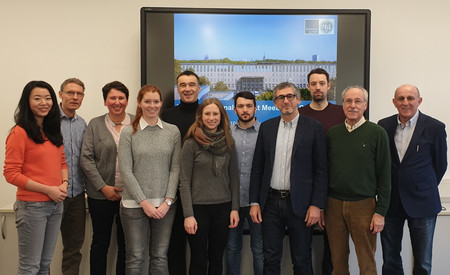
Vom 11. bis 13. Februar 2019 traf sich das gesamte GoodVET-Projektteam bei G.R.E.A.T. an der Universität Köln.
Das internationale Team aus Dänemark, Italien, Österreich und Deutschland arbeitete drei Tage lang an wichtige Qualitätsindikatoren für die Integration von Geflüchteten in die berufliche Bildung. Die Erstellung des Qualitätshandbuches sowie des Online-Analysetools war der Hauptkern dieses Treffens.
Weitere wichtige Meilensteine für das Projekt wurden in äußerst fruchtbaren Diskussionen erfolgreich erarbeitet.
Weitere Information zum Projekt GoodVET finden Sie unter: http://www.goodvet.uni-koeln.de/
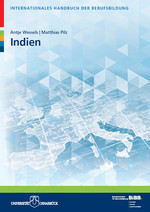
Bundesinstitut für Berufsbildung, Bonn
Mit einer Bevölkerungszahl von 1,3 Milliarden ist Indien das zweitgrößte und aus europäischer Sicht ein exotisches Land mit vielen Gegensätzen und einer ganz anderen Kultur. Seit den 1990er-Jahren greifen umfangreiche Reformen und die wirtschaftliche Entwicklung des Landes hat auf vielen Ebenen Fahrt aufgenommen. Auch die berufliche Bildung in Indien ist damit in den Fokus gerückt und muss den daraus erwachsenen Herausforderungen Rechnung tragen. Sowohl deutsche Unternehmen wie auch die Akteure der Berufsbildungskooperation sind in der beruflichen Bildung in Indien tätig. Neben den kulturellen Besonderheiten des Landes prägen die Berufsbildungslandschaft auch angelsächsische Konzepte, eine starke Tendenz zur Hochschulbildung, eine geringe Beteiligung der Wirtschaft und eine komplexe Steuerungsstruktur.
Rezension von Uma Gengaiah - Indira Gandhi National Open University, India
Gastvortrag von Prof. Dr. Bettina Fuhrmann, Wirtschaftsuniversität Wien (WU)
Der Lehrstuhl für Wirtschafts- und Sozialpädagogik von Prof. Dr. Matthias Pilz freute sich Prof. Dr. Bettina Fuhrmann, WU Wien, am 09.01.2019 begrüßen zu dürfen.
Prof. Dr. Bettina Fuhrmann war am 9. Januar 2019 Gastvortragende am Institut für Berufs-, Wirtschafts- und Sozialpädagogik. Sie präsentierte die Forschung zu Wirtschaftsbildung an ihrem Institut für Wirtschaftspädagogik an der WU, insbesondere das Projekt "Ökonomische Bildung am Ende der Sekundarstufe I in Österreich". Die Ergebnisse wurden nicht nur intensivst diskutiert, sondern sind auch die Grundlage für Überlegungen zu den nächsten Forschungsprojekten. Auch Kooperationsmöglichkeiten zwischen Köln und Wien wurden ausgelotet - ein produktiver und höchst konstruktiver Start in das Jahr 2019.


